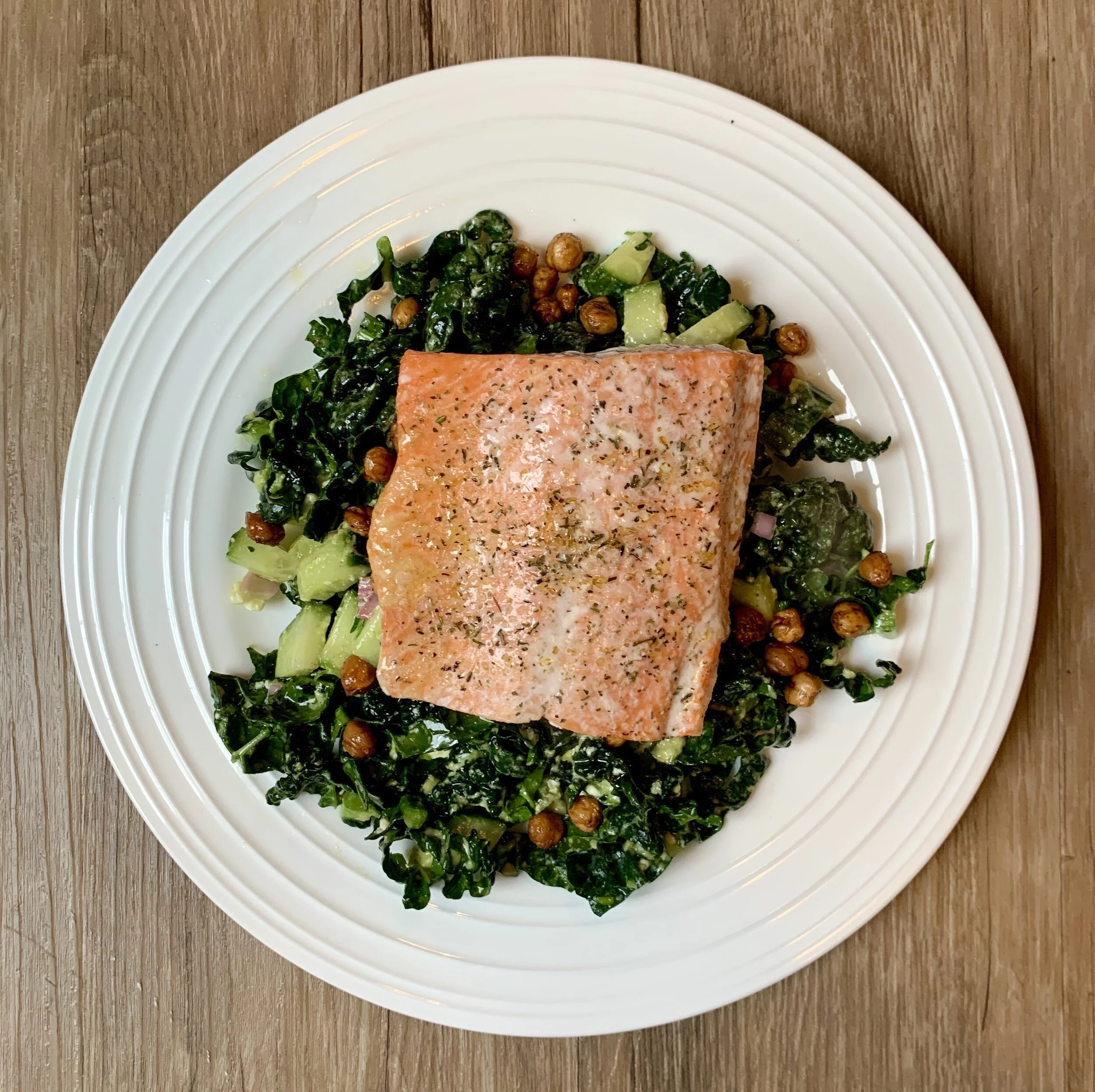Salmon Over Tuscan Kale & Spiced Roasted Chickpeas
Serves: 4 People | Total Time: ~40 minutes
Ingredients:
Salad
3 bunches of Tuscan kale, sliced (also known as Lacinato kale, dinosaur kale, or Italian kale)
1 cucumber, diced
1 avocado, diced
1/4 c. crumbled feta cheese
Dijon Vinaigrette
2 Tbs. shallots, finely chopped
1 Tb. Dijon mustard
4 Tbs. white wine or champagne vinegar
1/2 c. olive oil
Salt
Pepper
Salmon
4 salmon filets (4-6 oz. each)
Seasoning of choice (I used a spice mix called Mural of Flavor by Penzey's Spices. Garlic powder or lemon pepper are great choices too!)
Salt
Olive oil
Fresh lemon juice for topping
Spiced Roasted Chickpeas
1 14-oz. can chickpeas (garbanzo beans)
1/2 Tb. paprika
1/2 Tb. garlic powder
Salt
Olive oil
Menu Steps:
1) Preheat oven to 400 degrees Fahrenheit.
2) Remove salmon from the fridge to ensure it’s close to room temperature before cooking.
3) Start preparing your chickpeas.
Remove chickpeas from the can into a colander or strainer.
Rinse chickpeas with water.
Place chickpeas on a baking sheet and pat dry.
Add paprika, garlic powder, a generous sprinkle of salt, and a glug of olive oil on top of the chickpeas. Toss.
Spread chickpeas out evenly on the baking sheet.
Cook for 35 minutes total, tossing at the 20-minute mark.
4) Prepare the dijon vinaigrette.
Finely chop a shallot until you have 2 Tbs. worth.
Add shallots, Dijon mustard, white wine/champagne vinegar, olive oil, a sprinkle of salt, and a few grinds of pepper to a bowl or jar. Whisk or shake vigorously until well incorporated.
Taste! Does it need more salt, vinegar, olive oil, etc.? Let your taste preference be the guide!
Set aside.
5) Place salmon filets onto a separate baking sheet. Top salmon with olive oil, salt, and your seasoning of choice.
6) Add your salmon to the oven when there are ~12 minutes left of cook-time for the chickpeas.
Individually-portioned salmon filets normally takes 10-14 minutes to cook, depending on the thickness of the filet size. The salmon I used for this recipe took 12 minutes to cook at 400-degrees.
If you prefer your salmon under- or over-cooked, then adjust your time accordingly.
7) While the salmon and chickpeas are cooking, prepare the rest of your components.
Chop the Tuscan kale into 1-inch strips.
Dice cucumber.
Halve, scoop, then dice the avocado.
8) Add the kale, cucumbers, avocado, feta cheese, and vinaigrette into a large bowl. Toss until vinaigrette is well-incorporated.
9) Remove chickpeas and salmon from the oven once finished.
10) Begin plating!
Add the kale salad as the base on each plate.
Top with roasted chickpeas.
Add a salmon filet on top of each bed of salad and chickpeas.
Squeeze fresh lemon juice over each salmon filet.
Enjoy!
Real Tips:
What are the different types of salmon?
Chinook/King Salmon
Considered the highest quality salmon. Rich flavor, high in fat, melt-in-your mouth.
Coho/Silver Salmon
Medium-fat content, subtle flavor, and delicate texture. Most similar to the King Salmon.
Sockeye/Red Salmon
High in "salmon" flavor, lean, and bright red. Easy to find and often used for smoked salmon. I used Sockeye filets for this recipe!
Salmo Salar/Atlantic Salmon
Mild flavor, easy to find, affordable. Atlantic salmon is always commercially farmed.
Humpback/Pink Salmon
Lean and mild. Most often used in canned salmon.
Silverbrite/Keta/Dog/Chum Salmon
Lean and mild. Most often used in canned salmon, but prized for its roe (fish eggs).
Let vinaigrette "soak" into kale.
Kale is one of the few lettuces that benefits from letting salad dressing soak in well before eating. This helps reduce the bitterness and intense crunch of the kale!
This is a great recipe to use your salad spinner if you have one!
Dicing cucumbers and de-seeding.
Cut cucumber in half. Cut each half length-wise, then cut each quarter into strips length-wise. Dice strips.
If you want to remove the cucumber seeds for maximum crunch, run a spoon along the middle of the cucumber after you cut each half length-wise to scoop out the seeds.
